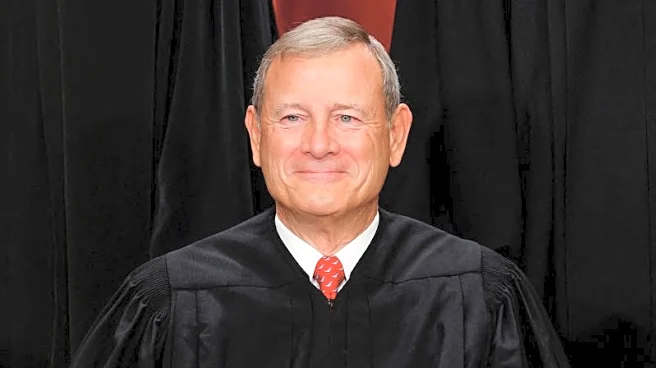By Jan Wolfe
WASHINGTON (Reuters) -John Roberts was not supposed to be the U.S. chief justice. When President George W. Bush nominated him to the U.S. Supreme Court in 2005, it was as one of the nine-member
body's eight associate justices. But when then-Chief Justice William Rehnquist died just weeks later, Bush decided to tap Roberts for the job.
In the 20 years since becoming chief justice on September 29, 2005, Roberts has established himself as a pivotal figure in the court's history, guiding it during a momentous epoch when its conservative majority has steered U.S. law dramatically rightward. And there are no signs of letting up as a new nine-month term dawns in October with more major cases awaiting.
The Roberts Court has made its mark in areas such as abortion, gun rights, race, religious liberty, campaign finance law, federal regulatory authority, transgender policy and presidential immunity. This year, it also has issued a series of decisions buttressing Republican President Donald Trump's extraordinary exertion of executive power.
Roberts, a mannerly conservative raised in the American Midwestern heartland, long has been seen as an institutionalist who preferred incremental change. But the rush of major rulings in the five years since conservatives gained a 6-3 majority on the top U.S. judicial body in 2020 after Trump was able to appoint three justices in his first term in office represents nothing short of a revolution in American jurisprudence.
Critics of Roberts, 70, have accused him of distorting the law to achieve his policy preferences. Eric Segall, a Georgia State University law professor, has argued that Roberts "changed the rules of the constitutional game" as much or more than any chief justice in U.S. history.
Roberts, for instance, has been instrumental in expanding presidential power, notably in the 2024 decision he wrote favoring Trump that recognized that presidents possess immunity from criminal prosecution for official actions in office. Roberts wrote that such immunity was required in light of the U.S. constitutional structure separating powers among the government's executive, legislative and judicial branches.
Liberal Justice Sonia Sotomayor wrote in a dissent that the ruling effectively created a "law-free zone around the president."
"In every use of official power, the president is now a king above the law," Sotomayor added.
Conservative legal experts counter that the Roberts court has corrected what they consider some poorly reasoned liberal precedents set decades ago by the court, such as the 1973 Roe v. Wade decision that had legalized abortion nationwide.
"The Roberts Court is the most conservative court in 100 years, and it has laudably corrected major jurisprudential mistakes in abortion, affirmative action, guns and the administrative state. While conservatives may not have won every major policy battle at the court, the consensus is they have won the war - at least for now," George Mason University law professor Robert Luther III said.
"Conservatives overwhelmingly welcome the court's overturning of Roe v. Wade, its ruling that the (U.S. Constitution's) Equal Protection Clause bars racial preferences in college admissions, and its various rulings on religious liberty," said Ed Whelan of the Ethics and Public Policy Center, who served as a Bush administration Justice Department official.
Roberts has personally written the decisions in some of the biggest cases decided in the past two decades, though on occasion he has been more cautious than some of his fellow conservative justices.
"The modern conservative legal movement had been trying for a half-century to achieve the changes in American constitutionalism that have come under John Roberts, and he has played a significant leadership role in bringing those things about," University of Pennsylvania political science professor Rogers Smith said.
TWO REBUKES
The Roberts Court has been a friendly venue for Trump this year in decisions it has issued on an emergency basis allowing the president to implement hardline policies that had been impeded by lower courts on immigration, mass federal layoffs, banning transgender people from the military, cracking down on diversity, equity and inclusion initiatives and other areas.
The genial Roberts and brash Trump could not be more different temperamentally. Roberts twice - in 2018 and again in March - has issued written statements rebuking Trump over his criticism of federal judges who have impeded his hardline immigration policies.
Roberts released his statement this year after Trump called for impeaching a judge who ordered the government to halt the removal of Venezuelans it has accused of being gang members. Roberts noted that "impeachment is not an appropriate response to disagreement concerning a judicial decision." But since then, Roberts has remained silent as Trump and senior administration officials continue to assail judges who have ruled against the president as "radical left," among other things.
RACE CASES
Roberts has made a particularly outsized impact on law concerning race. He wrote the court's 2023 opinion that struck down race-conscious policies in collegiate admissions as a violation of the constitutional promise of equal protection under the law. The court just seven years earlier, with a different ideological makeup, had upheld such policies.
In 2013, Roberts wrote the court's opinion that ended the requirement for states with a history of racial discrimination to receive federal approval before changing their voting laws.
Roberts authored the court's 2007 decision rejecting the use by school districts of race as a factor in assigning students to schools to achieve integration, also citing the equal protection provision. That decision included one of his best-known quotes: "The way to stop discrimination based on race is to stop discriminating based on race."
Roberts cast a deciding vote in the 5-4 ruling in 2008 that changed gun ownership in the United States by establishing that people have a constitutional right to possess firearms in their homes. The court expanded on that decision in major rulings in 2010 and 2022.
A CHANGE OF PLANS
Bush, a Republican, initially nominated Roberts to replace retiring Justice Sandra Day O'Connor. But Rehnquist died suddenly about 6-1/2 weeks later, and Bush instead nominated Roberts to become chief justice.
In this post, Roberts presides over the Supreme Court while also leading the broader federal judiciary and carrying out ceremonial duties such as administering the presidential oath of office, as he has done for Trump and Democratic former Presidents Barack Obama and Joe Biden. Roberts in 2020 also presided over the first of Trump's two impeachment trials - he was acquitted both times in the Senate.
Roberts, a federal appellate court judge at the time who had worked in the administrations of Republican Presidents Ronald Reagan and George H.W. Bush, won bipartisan praise during his 2005 Senate confirmation hearings for his calm demeanor, intellect and folksy Midwestern charm.
"Judges are like umpires. Umpires don't make the rules. They apply them. The role of an umpire and a judge is critical. They make sure everybody plays by the rules. But it is a limited role," Roberts testified, using a baseball analogy.
"And I will remember that it's my job to call balls and strikes, and not to pitch or bat," added Roberts, who the Senate voted 78-22 to confirm.
The court has undergone quite an evolution under Roberts.
"Roberts was a conservative when he came to the court, but the court around him was less conservative overall because you had swing justices," said Erwin Chemerinsky, dean of the University of California, Berkeley School of Law, referring to justices on the court's ideological center who often decided the outcome of major cases.
"But over the 20 years that Roberts has been a justice, the Supreme Court has become much more conservative and constitutional law has become much more conservative," Chemerinsky added.
Roberts at times has drawn the ire of fellow conservatives. He broke with the court's conservative bloc in a 2012 ruling he authored that upheld Obama's signature healthcare law. That decision contributed to a perception by some analysts of Roberts as an institutionalist who prioritizes protecting the Supreme Court's legitimacy over the pursuit of personal policy or political preferences.
The court's 2022 Dobbs v. Jackson Women's Health Organization decision that overturned Roe, which had recognized a woman's constitutional right to an abortion, was instructive about the Roberts approach. Roberts agreed with the five other conservative justices in upholding a Republican-backed Mississippi law that banned abortion after 15 weeks of pregnancy but opposed taking the additional step of erasing the Roe precedent altogether.
Some legal experts called his reputation as an institutionalist overstated. For example, his approach in Dobbs simply would have put off formally overturning Roe to another day, according to American University law professor Stephen Wermiel.
"I believe he would have voted to overrule Roe in the next case," Wermiel said.
(Reporting by Jan Wolfe; Editing by Will Dunham)









